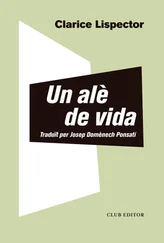This was what she needed: to feel the sea inside her like a man’s dense sperm. Now she is truly equal to herself. Her nourished throat becomes parched with salt, her eyes redden as the salt dries in the sun, the gentle waves come beating against her and then retreat, her body acting as a solid shield.
She plunges in once more, swallows more water, now less avid and intense, for her thirst has been slaked. She is the lover who knows she will possess everything anew. The sun comes out further and causes her to shiver even as it dries her. She takes another plunge, ever less avid and intense. Now she knows what she wants. She wants to remain standing still in the water. And that is precisely what she does. As if beating against the side of a ship, the waves come beating against her, retract and return. There is no transmission. The woman needs no communication.
She then walks through the sea, heading for the shore. She is not walking over the waters — that she would never do, thousands of years after those waters have already been walked over — but no one can rob her of this: to be able to walk through the sea. Sometimes the waves put up resistance, pushing her back with force, whereupon the woman, like a ship’s figurehead, presses on, a little more determined and severe.
Now she is treading the sands. Aware that she is gleaming with water, salt and sun. Even if she were to forget within minutes, all this will be hers forever. And she knows in some obscure way that her dripping hair belongs to someone who has been shipwrecked. Because she knows — she knows she has survived danger. A danger as ancient as man himself.
A CHALLENGE FOR THE PSYCHOANALYSTS
I dreamed that a fish was taking its clothes off and remained naked.
Someone gave me a sweater. That seems simple enough. But it is not.
The sweater was sent to me by a girl I did not know. I discovered through a mutual friend that she is a designer of considerable talent. She lives in Sāo Paulo. On a visit to Rio, she had lunch with him. She arrived wearing a very pretty sweater and my friend, thinking it would look good on me, ordered one in exactly the same pattern. The girl happens to be one of my readers — or am I mistaken? And when she discovered who the present was for, she insisted on buying it for me herself. Our mutual friend agreed.
So here I am, the proud owner of the prettiest sweater you ever saw. It is a bright cherry red and seems to embody all that is good for both of us. That warm red is the colour of the sweater’s soul. I am writing these lines before going out, wearing my new sweater. The colour of fire and flame, it has been given to me with such affection that its warmth embraces me and keeps out the chill of solitude. It is like being caressed in deep friendship. Today I am wearing it in public for the first time. The sweater is ever so slightly tight, but perhaps that is how it is meant to be worn: proudly flaunting the glorious state of womanhood. The moment I have stopped writing, I shall spray myself with my favourite perfume. My little secret. I adore secrets. And then I shall be ready to face the wintry cold outside: the real cold as well as those other chills we experience.
I am just another woman too many.
HOW TO TREAT ONE’S POSSESSIONS
There is a creature living inside me as if he were at home, and he is. He is a black horse with a shiny coat and although completely wild — for he has never lived inside anyone before nor ever been saddled — although completely wild, this gives him that primitive sweetness of a creature without fear. His nose is moist and fresh. I love kissing that nose. When I die, the black horse will be homeless and suffer a great deal. Unless he can find another home where no one will be afraid of this creature who can be savage and at the same time so gentle. I must warn you that the horse is nameless: you need only call him in order to discover his name. Or perhaps you will not discover it, but once called with tenderness and authority, he comes. If his sense of smell tells him that a body is free, he comes trotting up quietly. But I should warn you not to be afraid when he neighs: you could easily be deceived into thinking some human being is giving voice to pleasure or wrath.
There once lived a girl who spent so much time observing hens that she came to understand their souls and deep anxieties. The hen is anxious, unlike the cockerel who suffers from an almost human anguish: he is deprived of any true love from his harem. Besides, he has to keep watch all night long, awaiting the first glimmer of dawn in the distant sky before singing those sonorous notes. That is his duty and art. But coming back to the hens, the girl kept two of them as pets. One was called Pedrina: the other Petronilla.
Whenever the girl suspected one of them might have a liver infection, she would sniff under its wings as if she were a trained nurse. She believed this was the first symptom of any illness, because the stench from a live hen is no joke. She would then ask her aunt for some medicine. Only to be told: ‘But there’s nothing wrong with your liver.’ Feeling she could confide in her favourite aunt, the girl explained why she needed the mediine. She also felt it wise to administer equal doses to Pedrina and Petronilla in order to prevent any contagion. There was really no point in giving them any medicine because Pedrina and Petronilla continued to spend the whole day pecking away at the soil and eating all sorts of rubbish likely to harm their livers. And the stench under their wings was something awful. It never occurred to the girl to try using deodorant because where she lived in Minas Gerais people did not use deodorants and their underwear was made of linen rather than nylon. Her aunt continued to give her the medicine, a dark brown liquid which the girl suspected might be water coloured with a few drops of strong coffee — and then there was the awkward business of forcing open their beaks in order to administer the medicine that would finally cure them of being hens. The girl was too young to understand that humans cannot be cured of being humans or hens of being hens: humans, like hens, have their failures and triumphs (the hen’s triumph is to be able to lay a perfect egg), something inherent in the species. The girl lived in the heart of the countryside and there was no chemist in the neighbourhood.
There was a further crisis when the girl discovered how thin Pedrina and Petronilla had become under their ruffled feathers, despite the fact that they never stopped eating all day long. The girl had not yet realized that to fatten them up would only hasten their destiny which was to be killed and eaten. And she went on struggling to open their beaks. She could soon sense every little thing about the hens in that great farmyard in Minas Gerais. And when she grew up, she was surprised to learn that the word hen or chicken in the local jargon also meant coward. The irony of the situation escaped her:
– ‘But it’s the cockerel who is the nervous creature as he goes chasing after the hens! The hens give no bother! But the cockerel moves so quickly he can scarcely be seen! He is forever trying to find a hen to love him! Without success!’
One day the little girl’s mother decided to take her to spend the day at a relative’s house which was some distance away. And when she returned home, the hen whom she had known in life as Petronilla no longer existed. Her aunt told her:
– ‘We’ve eaten Petronilla.’
The little girl had an enormous capacity for love: the hen had never reciprocated that love, yet she had gone on loving it without hoping for anything in return. When she learned what had happened to Petronilla she began to loathe everyone at home, everyone except the mother who did not eat poultry and the servants who preferred beef. But she could scarcely bear to look at her father, for he was particularly fond of eating chicken. Her mother realized what was happening and tried to explain:
Читать дальше












